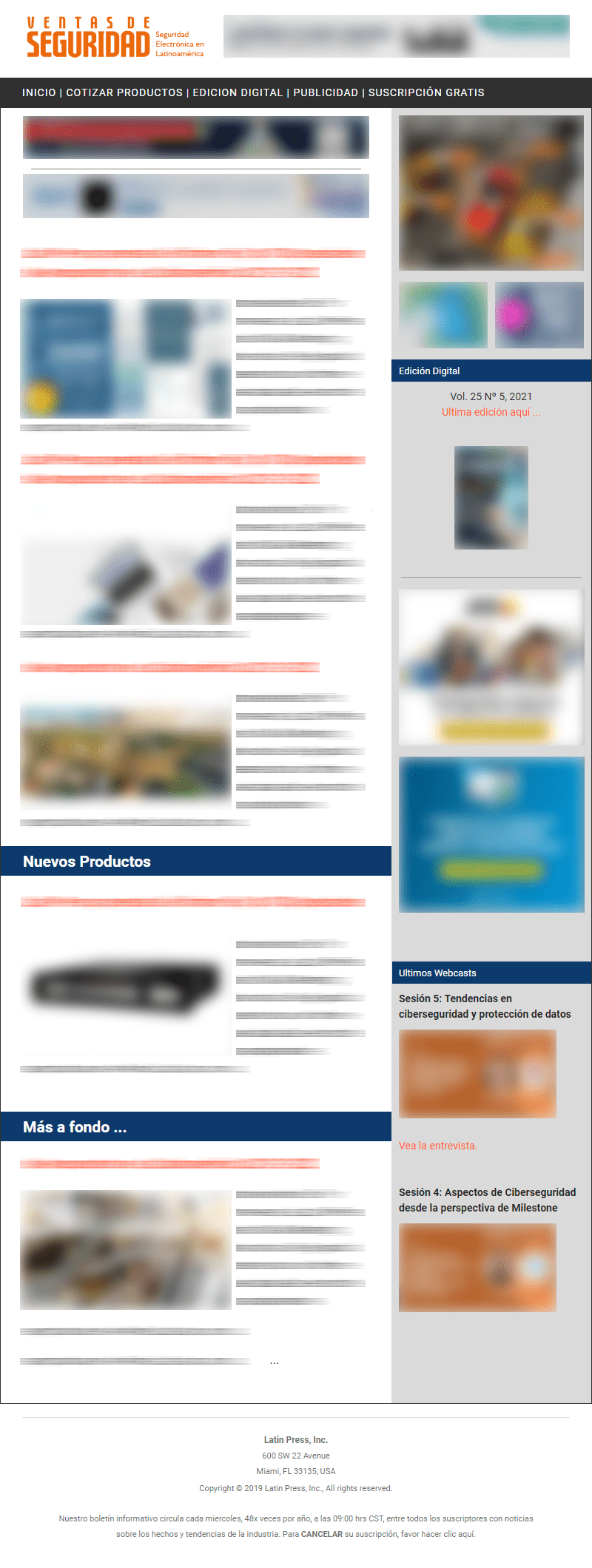 An interesting analysis on ethics and its application in our industry.
An interesting analysis on ethics and its application in our industry.
By Germán Alexis Cortés H.*
The answer will not be found in any technical manual. Many will read the title and turn the page unread. And it's not because they're unethical, it's simply because in this day and age, the issue is unimportant. Little by little I have seen how, some bad habits that we Latinos have, make things in our society do not work as we want. And there, it becomes interesting and important.
Definition
Let's start by defining the word, its meanings and the relationship with our work. It comes from a derivation of the Greek ethos, which means character. We apply ethics every day in our daily lives, in the acts, decisions and behaviors that we have both personally and professionally. Aristotle said that ethics aims to establish the supreme purpose, which is collective and individual happiness.
On the internet I found that it is the "Philosophical discipline that studies good and evil, as well as their relations with morality and human behavior"; also that it is the "Set of customs and norms that direct or value human behavior in a community". Some tend to confuse it with morality and others with law enforcement. I would not like to go into philosophical or lexical issues.
But then I discover that each person has a different sense of ethics and what for some may be unethical, for others not; it depends on the principles, ideals, norms, scale of values that each one has and that depends on our upbringing, culture and model of life. Is everyone right? Maybe not.
At a professional level, they are the codes that regulate our profession. They are the foundations, principles and rules of mandatory compliance so that our society accepts us and we can live together. Although they are not mandatory (such as a Law); when we depart from these precepts, we almost always cause harm to others or even to ourselves. Therefore, although none are taken to jail for being unethical, they would be walking a dangerous, risky and complicated path.
We are required to learn about ethics, values and honesty... it sounds harsh, but it's the reality.
35 Examples Where Ethics Fails
Haven't you understood it yet? Let me give you a few examples. Surely some cases will feel very close:
1. A salesperson of the company, deceives his client, telling him that the technology we are selling him is the best, when it is perfectly known that there are others that would serve him even more.
2. The Manager of that same company, rewards you as the best seller, indicating that you are a great professional; although internally he knows about the deception, he recognizes that there are other sellers better than him and remembers that he has alcohol problems and makes it unfulfilled.
3. The pre-sales engineer who must prepare a technical offer and makes use of the most famous computer function: "copy and paste", so that, in the eyes of the end user, it seems an impeccable work, full of engineering and details; however, his conscience knows that he does not even remember the spaces that must be protected and that the number of devices are not really what is required.
4. The commercial director of the company, feels comfortable with the great professional level of his engineering team, although
deep down he knows that engineers are not so good, but he doesn't
it matters, because everything will change when you really get to the work.
5. The seller who increases the prices of his proposal, and have a "cushion to negotiate". Even if you do not think so, this is a deceptive practice, of closing the sale. The buyer knows it, gets used to it and that's why he asks for huge discounts.
6. The supervising engineer of the work team, who has covered 60% of the work, but makes a report indicating that he reviewed the entire work. When a third party warns of a problem,
the same engineer (to cover his fault) induces to make others think, that there is a problem with a group of technicians who do not do their job well and that it is better to change them.
7. The lazy installer who forgets to wire an output and then convinces with "technical arguments" to change the location of that device, putting the safety of the end user at risk; but managing to cover up his mistake.
8. Another installer who decides to place the two cameras of a space, at the same point, to save wiring; when in reality an image is against light, losing the investment of the end user. And nobody says anything, because as the end user does not know about it.
9. The engineer in charge of imports, who to finish his work quickly, decides to buy only 2 or 3 references of equipment, when he negligently knows that there are a variety of references and variations that could give a better security solution. But what laziness, it is better to simplify and standardize.
10. The architect of the construction company who buys the most economical equipment, knowing that it will not really work, but that because the technical standard does not detail it, it can happen.
11. Misleading advertisements with which certain construction companies sell their projects, offering "intelligence" in their properties, when in the end they know that they are only going to place on the first floor, a couple of cameras of the most economical on the market.
12. The corrupt-minded consultant, who recommends a system with the "made-up" technical specifications of the brand that offers him a commission to sell his equipment; but to the end user, it makes him believe that his work is impartial and that he thinks only of benefiting him.
13. The technical supervisor who only accepts the rebranding of a device, when the integrating company"helps" him for his personal economy.
14. The manager of the company who authorizes some legal imports, but knows that there are others that are smuggled in, in order to win some projects.
15. Another manager who "makes up" the financial data, to obtain benefits in a project or with the tax authorities.
16. The public or private official who must buy the security system for his institution and "inflates" the project budget by 3, to keep a good slice of the budget.
17. The manager of the integrating company, who knows that he must pay the "favor" in cash and without leaving evidence.
18. The commercial manager of the integrating company, who offers 1 year warranty, when he knows that the factory has offered him 3 years. But it stands out to its customer, that it will give you a "special discount" for the 3-year extended warranty.
19. The seller who indicates that his company has the solution to everything the customer needs and offers services in which there is not really experience and knowledge.
20. The know-it-all engineer, who if he does not know the answer invents it, so as not to lose the confidence of his interlocutor, sometimes members of his own work team.
21. The commercial advisor who talks about more and generates rumors to make the competition look bad, when the strategy of "I help you, but you help me" has not worked.
22. The seller who ignores confidentiality agreements and takes advantage of the information to improve his income.
23. The engineer or technician who, one week after training in the country of origin of a factory, resigns from the company because in the competition, he was offered better conditions.
24. The buyer who tells the company he installs, that he must present him with another 2 filler offers, to ensure the "impartiality" of the purchase process.
25. The distributor who clearly and concisely promotes a product line with significant discounts, but knows that next year it will go out of production at the factory.
26. The maintenance team of a safety system, which is limited to cleaning, making them work and avoid measuring, testing, adjusting, rethinking, improving the quality and updating the system.
27. The boss who discriminates against his own people and gives disrespectful orders in his work team to certain races, religions, nationalities or even disabilities.
28. The repair and service workshop, which gives for total loss a device for the end user to buy a new one or the factory assumes the warranty; however, he knows that, by changing a small part, it is given new life and can be resold in the "used" market. It is that you have to "re-seek" the money.
29. The factory that prints its brochures and manuals with "made up" specifications that make the product look like a better one, knowing that it is really worse than other references that are worth even less. Since no one realizes that, as no one has a way to prove it, as consumers are ignorant, then deception is possible.
30. The expert engineer who, for an extra payment, decides to sell keys and methods to access the main information of a security system and disappear or modify certain information.
31. The trainer who has the confidence of his students and decides to speak only about the benefits and characteristics of certain brands and removes from his program the benefits of other brands that do not "help" him.
32. The student who does not research, attend, or read, but wants to be given the certificate of knowledge, because his company paid.
33. The technician or engineer who does not have time for courses, because he has been in the guild for many years; but he takes the basic exam and loses it.
34. The engineer who recommends a special reference of the mark he represents, but never really met the minimum criteria or made calculations to justify it.
35. The employee who does not stop using the cell phone, even within meetings with her bosses. The same as at lunch with customers, he does not stop chatting with his other customers.
36. The engineer who proudly delivers integrated security systems, but really knows that they do not share information and that there is no automated operation. However, since the client did not demand it and does not understand it, we convinced him that he was left with a very modern system.
37. How many more examples can you provide?
I could fill sheets and sheets into examples from our industry, which make us embarrass several. However, for some others, many of these actions are fair and logical. They are everyday and do not seem adverse, they seem normal. That is why I must remember that ethics depends on many factors and dialogue and education must be done so that we all have the same scale of values or at least similar.
Just to give an extreme example that helps us understand, I remind you that, in Medellín, in not too distant times, the hitman who had to eliminate a person, prayed to God in his house before leaving, then gave a kiss to his partner and went out to work. Do you realize how the scale of values for that person was a very different one from that of your victim or even that of your boss, who gave you work?
Principles of ethics
Professional associations and institutions in general, normally adopt or draft a code of professional ethics, adjusted to the norms, customs and laws of each region; however, I want to focus on four (4) basic principles that have been disseminated by the Colombian Association of Engineers - ACIEM:
a. Professional Integrity, promoting good practices, respect for others, with honor and dignity.
b. Veracity, acting in accordance with the truth, honesty and transparency in the execution of our work, in the public expression of our concepts and being trustworthy agents for users, customers, colleagues, colleagues, employees and employers.
c. Precision, developing our activities with precision and rigor, exclusively within the thresholds of our competence, supporting our professional development in the merit and quality of our services.
d. Responsibility, taking into account the consequences of our actions, giving priority to the protection of life, safety, the environment and the care of the public or private goods of our clients, promoting personal development and updating of knowledge, both our own and that of colleagues and third parties.
From these principles, almost all the necessary aspects are derived and complemented to make us feel good about ourselves in the development of our professional practice.
Doing the right thing
Just like that, when we actually do the right thing, we are being ethical in our actions. Our actions should not harm anyone and should follow a pattern of good values, customs and norms that we must respect.
So, every company should have a code of ethics, which it writes calmly (abandon the practice of copying and pasting), to be sure of what we want our team to do. It must be published, disseminated and made to be put into practice within each company. It is one of the internal courses that we must all take, understand and keep in mind in the daily routine.
I leave you a list of values and positive concepts to help you create your own code of ethics and form your own scale of personal, work and corporate values: Honesty, Professionalism, Responsibility, Transparency, Sincerity, Justice, Freedom, Respect, Tolerance, Gratitude, Solidarity, Generosity, Fidelity, Loyalty, Love, Peace, Coexistence, Family, Friendship.
Proceeds
Some may ask: And what is all this for? That is, what benefits we would have compared to a company that is not based on ethical principles.
I can think of many benefits, because we were finally taught (and it is very true) that whoever does things well done, is on the right track (which is not necessarily the shortest, straightest and easiest, but believe me it is not the most difficult either).
We earn the respect of our employees, bosses, suppliers, customers and relatives. That allows better human relationships, trust and increased sales.
We improve the collaboration and support of the entire service chain, making us more profitable.
We empower our employees and customers, increasing loyalty to our service and thus ensuring that your customers will not leave.
Employees enhance the passion they have for safety, technical and economic issues. This reduces internal problems and increases the commitment to offer an efficient solution.
The recognition of the sector, having an impeccable resume at a personal and corporate level is very important. At the work level it is very important to build a reputation of good level and without any qualms. That no one speaks anything bad about us as people or employees, is a great achievement that must be maintained.
As a psychologist friend said: in moments of truth, these things go out of the pores, and then it is relatively easy to know who is a good professional and who has a past that does not forgive him.
When we have a clear conscience, we feel inner pride and have the peace of mind for us to progress, to take better advantage of opportunities and then for business to improve.
When we are ethical, we improve our social responsibility with the guild and abandon that manipulative phrase that does so much damage to us Latinos: "the living, lives on the fool." It's really not good to be the fool; but ethically it is not good to be the living, who passing over the rights of others, takes advantage of the fool. You have to be fair.
And now, you think: Are We Electronic Security professionals ethical?
* Germán Alexis Cortés Hernández is a Colombian electronic engineer, president of the Insetrón Consulting company – Electronic Networks Consulting. Instructor of WINGS and the ALFIL academy. He has participated in numerous Building Automation projects in Latin America. [email protected] - [email protected]

























Leave your comment